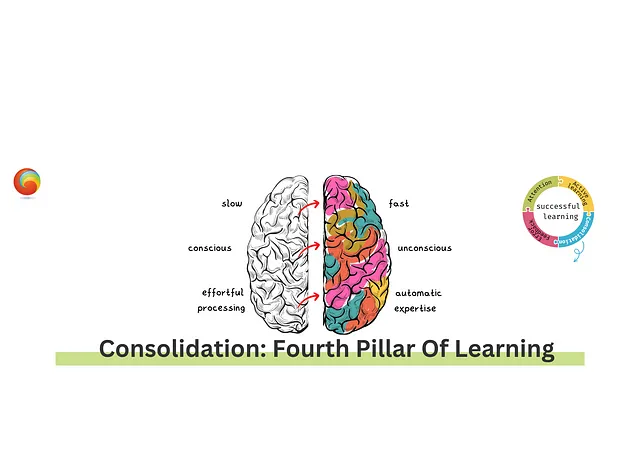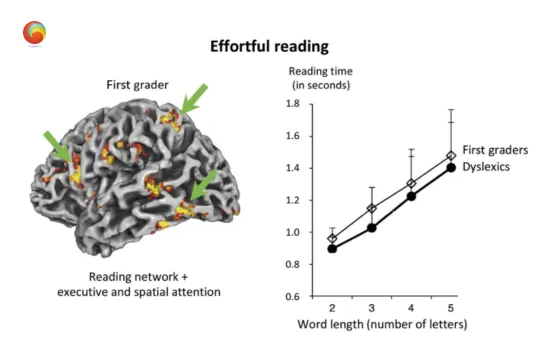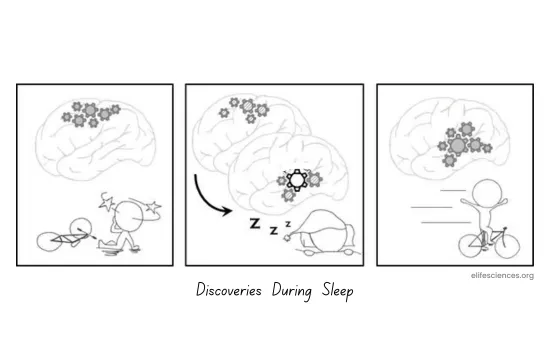Consolidation: The Fourth Pillar Of Learning
 Swabhav Techlabs
Swabhav Techlabs
Consolidation is the fourth pillar of learning, which renders what we have learned fully automated and involves sleep as a key component.

Consolidation: the fourth pillar of learning
Consolidation: the fourth pillar of learning, happens in all domains: a shift from slow, conscious, and effortful processing to fast, unconscious, and automatic expertise. Our brains never stop learning. Even when a skill is mastered, we continue to learn it.
Automatization mechanisms “compile” the operations we regularly use into more efficient routines. They transferred them to other brain circuits, outside our conscious awareness, where processes can unfold independently of one another without disrupting other operations in progress.
Freeing up brain resources
Whether we learn to type, play a musical instrument, or drive a car, our gestures are initially under the control of the prefrontal cortex; we produce them slowly and consciously, one by one. Practice, however, makes perfect; over time, all effort evaporates, and we can exercise those skills while talking or thinking about something else. Consolidation, the fourth pillar of learning, further solidifies our abilities, allowing us to perform these tasks effortlessly and seamlessly as if they were second nature. The same shift happens for arithmetic.
For a beginner child, each calculation problem is an Everest that requires great effort to climb and mobilizes the circuits of the prefrontal cortex. At this stage, a calculation is sequential: to solve 6 + 3, children will typically count the steps one by one: “Six . . . seven, eight . . . nine!”
As consolidation progresses, children begin to retrieve the result straight from memory, and the prefrontal activity fades away in favor of specialized circuits in the parietal and ventral temporal cortex. Consolidation, the fourth pillar of learning, facilitates this shift, enabling swift and automatic retrieval of information or skills. With practice, these circuits take over, making performance effortless...

Consolidation: the fourth pillar of learning

Consolidation: the fourth pillar of learning
Why is automatization so important?
Because it frees up the cortex’s resources. While our brain’s central executive is focused on one task, all other conscious decisions are delayed or canceled. Thus, as long as a mental operation remains effortful because it has not yet been automated by overlearning, it absorbs valuable executive attention resources and prevents us from focusing on anything else. Consolidation is essential because it makes our precious brain resources available for other purposes.
Let us take a concrete example.
Imagine if you had to solve a math problem but your reading had remained at the beginner’s level:
“A dryver leevz Bawstin att too oh clok and heds four Noo Yiorque too hunjred myels ahwey. Hee ar eye-vz at ate oh clok. Wat waz hiz avrij speed?”
I think you get my point: it is practically impossible to do both things at the same time. The difficulty of reading destroys any capacity for arithmetic reflection. To progress, it is essential that the mental tools most useful to us, such as reading or arithmetic, become second nature — that they operate unconsciously and effortlessly. Consolidation, the fourth pillar of learning, is the key to achieving this. We cannot reach the highest levels of the educational pyramid without first consolidating its foundations.
The key role of sleep
We have already seen that learning is much more efficient when done at regular intervals: rather than cramming an entire lesson into one day, we are better off spreading out the learning. The reason is simple: every night, our brain consolidates what it has learned during the day. This is one of the most important neuroscience discoveries of the last thirty years: sleep is not just a period of inactivity or a garbage collection of the waste products that the brain accumulated while we were awake.
Quite the contrary: while we sleep, our brain remains active; it runs a specific algorithm that replays the important events it recorded during the previous day and gradually transfers them into a more efficient compartment of our memory.

Consolidation (Image Credits: brain post. co)
The amount of nightly gain varies according to the quality of sleep, which can be assessed by placing electrodes on the scalp and monitoring the slow waves that characterize deep sleep. Both the duration and the depth of sleep predict a person’s performance improvement upon waking. Consolidation, the fourth pillar of learning, plays a vital role in this process.
Discoveries during sleep
Does sleeping merely strengthen memory? Many scientists think otherwise: they report making discoveries at night. The most famous case is the German chemist August Kekule von Stradonitz (1829–96), who first dreamed up the structure of benzene.

To learn about the concept of "nocturnal consolidation" and its role in enhancing learning and cognitive growth during sleep as how the brain replays and synthesizes ideas, compress information, and refines connections during sleep and how sleep may serves as a mechanism for simulating and processing a significant amount of experiences, contributing to cognitive development read here!
Subscribe to my newsletter
Read articles from Swabhav Techlabs directly inside your inbox. Subscribe to the newsletter, and don't miss out.
Written by

Swabhav Techlabs
Swabhav Techlabs
Swabhav Techlabs is a tech talent solutions company. We like to: Create value through talent and product creation. Build a community of people passionate about problem-solving and programming. Accelerate growing companies by building high-performing engineering teams for them. Ways We Create Value: Product Creation: Building a MVP by understanding the company vision, product purpose, selecting the right teck, chalking a roadmap, finding the best people & mentoring them. Talent Creation: Planning crazy ambitious hires and pulling them off by conducting skill gap analysis, working out the future openings, finding & mentoring them. Scouting and Mentor Young Product Teams: Developing your talent workforce of young tech graduates with our team of TA to scout and mentors to teach your tech stack. Scouting on Demand: Working on your live requirements to find senior engineering talent